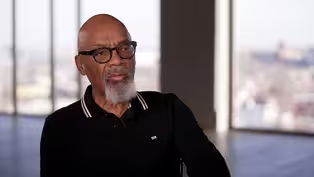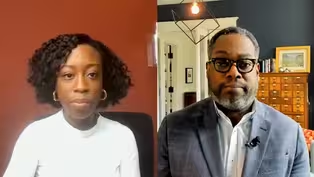
After 70 years, Detroit lacks Black Congress member
Clip: Season 51 Episode 8 | 9m 25sVideo has Closed Captions
For the first time in nearly 70 years, Detroit lacks Black representation in Congress.
For the first time in nearly 70 years, Detroit does not have an African American representative in Congress. Host Stephen Henderson leads a conversation with BridgeDetroit Executive Director and Editor Catherine Kelly to examine the changes in Detroit political power in Congress, and what impact the loss of African American representation may have on the city’s nearly 80% Black population.
Problems playing video? | Closed Captioning Feedback
Problems playing video? | Closed Captioning Feedback
American Black Journal is a local public television program presented by Detroit PBS

After 70 years, Detroit lacks Black Congress member
Clip: Season 51 Episode 8 | 9m 25sVideo has Closed Captions
For the first time in nearly 70 years, Detroit does not have an African American representative in Congress. Host Stephen Henderson leads a conversation with BridgeDetroit Executive Director and Editor Catherine Kelly to examine the changes in Detroit political power in Congress, and what impact the loss of African American representation may have on the city’s nearly 80% Black population.
Problems playing video? | Closed Captioning Feedback
How to Watch American Black Journal
American Black Journal is available to stream on pbs.org and the free PBS App, available on iPhone, Apple TV, Android TV, Android smartphones, Amazon Fire TV, Amazon Fire Tablet, Roku, Samsung Smart TV, and Vizio.
Providing Support for PBS.org
Learn Moreabout PBS online sponsorshipand I was aware of the idea for this podcast came from after Shri Thanedar was represented to, or elected to represent Detroit in congress, we decided that we didn't need to look at the idea of Black representation.
Where it is, and where it may be going.
- Yeah, not only was it new, it was really an imperative.
And I think about that time, it was the late '60s, early '70s when you had rebellions across the country.
And there was a real focus on Black economic power, Black political power.
I think you really saw that in the development of Detroit.
I think you still see those politics in the vision and the ideal.
But I think that's absolutely a part of our childhood and growing up.
I remember going to community meetings and political events and conventions and the focus was always pretty singular and very focused around maintaining Mayor Coleman Young's legacy, his political organization.
All that he was putting in place to make sure Detroit would be a Black city where Black people could benefit from it.
- Ma'am.
So, one of the things that comes up in a lot of the interviews that we did with people who were running for the 13th congressional district seat, and with Warren Evans who tried to bring people together around a consensus candidate is the way that Coleman Young approached this issue.
The authority, I guess, that he had.
Now to be able to say, "Look, what's important is that we all get a voice in who's elected, and the way to do that is to work together."
And I'm gonna boss up on the people I need to boss up on, but that's the way we maintain this.
They all said that that doesn't work anymore in Detroit, and that you don't have a figure who could do that, but you also don't have people who are willing to set aside their own ambitions necessarily for the idea of the community.
- I think it's kind of a sign of the times.
What is Blackness now?
I thing during those years, the experience of Black people was more similar.
I think you can have a diversity of experiences now that you didn't have then.
You have Black people who grew up in the suburbs and moved back to the city.
You have more income diversity.
So I think the interests and the focus of Blackness has also changed.
If there ever was one monolithic thing, but I do think one thing that united certain objectives was more of a shared experience than what you have now.
If you look at what has happened around redistricting and the loss of Black representation even on a statewide level, what does Blackness mean nowadays?
What are black interests?
It was something that came up in my conversation with Adam Hollier about his run.
Are there interests that Black candidates now represent?
And if so, what are they?
You have more Black people living in the suburbs.
There was a time, we've talked about it, the two of us, there was a time when if you traveled anywhere and someone who wasn't Black said they were from Detroit, you were like, "No way, where you really from?"
And they'd always tell you some suburb, and you'd be like, "No."
Because it was that definitive and clear.
- If you think about the things that someone like Shri Thanedar, who is an immigrant to this country, somebody who didn't grow up under really extreme poverty conditions, and now will represent Detroit in Washington.
If you think of the things that he might have trouble getting his mind around, if you think about the things that he might struggle to really represent how Detroiters feel and what they might need, what comes to mind?
- I think some of this will be ... Will kind of unfold, and I don't mean to punt on that, but I think as a legislator, there's less more room for nuance than I think more executives see it.
It's just kind of the function of what it is.
But, and especially in a national context, but I do think locally, there really is going to be this ...
There's gonna be more of an opportunity to examine where do Black interests, if there are any, separate from democratic policies and interests?
If you look at the agenda that the democrats have laid out in Lansing right now, there's some, there's some bright spots, but it's very much a democratic agenda.
And how will it affect Black people especially in Detroit?
If you look at the last election and what happened, how Detroit voters moved on Prop 3, more than 83%, I believe of voters, voted to support a woman's right to choose an abortion.
I think that really illustrates how there are certain interests and certain beliefs in a majority Black city that are different.
Sometimes that partisan bickering doesn't even work here.
There's a bigger set of issues and concerns and it will be interesting at what moments will the democrats take up things that actually impact Detroit?
In the past there's been such a stall around instituting legislation that could help the city.
One of the big things that I think Detroit needs to focus on is its revenue stream.
As income taxes have fallen off and people are increasingly work from home, a lot of these policies that Detroiters have criticized through the years, investing in casinos, investing in bringing big corporations downtown, what has it really done for city residents?
What is it doing?
And this is a real moment to kind of test where democrats and race kind of fall because it's this time to shift, give Detroit the ability to tax on how we're building our economy which is on entertainment, which is on casinos and sharing economy and restaurants.
- One huge distinction with Shri Thanedar, I think, is that sense of history.
That sense of memory.
And that's not his fault.
No one chooses where they're born, but for those of us who are from here.
I have a close friend who always says that you become a real Detroiter when the city takes something precious from you.
- Wow.
- Which is a really dark way to think about it, but I think there's something really true about that.
And I worry, I worry about someone like Shri Thanedar, who I think is very well intentioned and is not cynical about what he's doing, I don't think he can surmount that hurdle.
- And if you also think about the visionary legislation that some of these Black representatives moved.
You have Representative Conyers who went in and created the legislation about studying reparations.
Will the kind of impetus, the vision, the innate belief and desire to move that kind of agenda or set that kind of agenda, will that come from our Brown representatives?
The do a lot of ...
They fall on the right side of a lot of these issues.
They're for funding schools.
They're for a lot of very baseline things that help a lot of people, but there are always some really specific things that I do deeply believe that Black people need and deserve.
Detroit’s Black political representation: Past and present
Video has Closed Captions
Clip: S51 Ep8 | 6m 19s | Examining the history of Detroit’s Black political representation in Congress. (6m 19s)
Healing from the mass shooting at Michigan State University
Video has Closed Captions
Clip: S51 Ep8 | 5m 54s | How does Michigan State University start to heal after the Feb. 13 mass shooting? (5m 54s)
Providing Support for PBS.org
Learn Moreabout PBS online sponsorship
- News and Public Affairs

Top journalists deliver compelling original analysis of the hour's headlines.

- News and Public Affairs

FRONTLINE is investigative journalism that questions, explains and changes our world.












Support for PBS provided by:
American Black Journal is a local public television program presented by Detroit PBS

